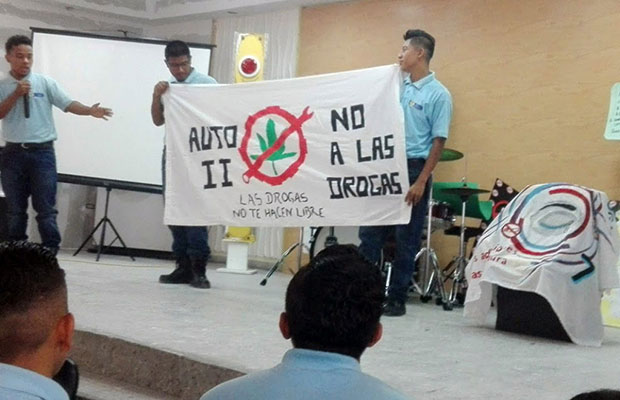
A Real-World Campaign for Positive Social Change
On a stage in front of their classroom, three students at San Juan Bosco Vocational Training Center (VTC) in Tegucigalpa, Honduras hoist a banner reading No a las drogas: “Say ‘no’ to drugs.” These young men, joined by nearly 200 of their peers, are applying their training toward an interdisciplinary project that not only demonstrates the practical applications of their skills—but also promises to help address a growing crisis among fellow youth.
According to the Honduran Institute for the Prevention of Alchoholism, Drug Addiction and Drug Dependence (IHADFA), youth are the largest consumers of these substances in the country—with many of them first experimenting as young as the age of eight. In a nationwide survey conducted in 2012, the organization discovered that “at least 100,000 students use marijuana; 47,000 use cocaine; 37,000 use crack and other drugs; and 174,000 drink alcohol,” as quoted in an article covering the issue. In that same article, IHADFA’s general director, Rony Efraín Portillo, observed that “the use of drugs among young people is hard to control because drugs have a presence all over the country. Only by acting together can we face this evil.”
This is exactly what San Juan Bosco students intend to do. Because substance abuse has only continued to grow in the years since 2012, they identified the need to conduct a broad-based awareness campaign—and have begun working together to coin slogans, design logos, create signage and make presentations educating children and adolescents about the issue, and of the dangers of using drugs and alcohol. Students in several different technical sections collaborated on this early yet important prevention project, with positive messages including “Yes, you can live without drugs!”
“So many of VTC’s students are acutely aware of this issue, because they come from highly vulnerable situations themselves,” says Father Mark Hyde, director of Salesian Missions. “They come from areas with rampant gang and drug trafficking activity, and where despair is woven into the community fabric. To see them take responsibility for making positive social change, and to use the education they’ve been afforded to do so, gives me great hope. This is the reason our missionaries do what they do every day.”
At the VTC, nearly 250 at-risk youth participate in two-year training programs developed according to the job opportunities at local companies. These include disciplines such as welding, motorcycle mechanics and construction. An additional 1,000 students attend classes in other areas, such as graphic design, as well as more traditional subjects.
Each student who attends the VTC is there due to direct outreach. Accompanied by his fellow educators, Brother Oscar Pereira, who directs the center, travels into some of Tegucigalpa’s roughest neighborhoods to meet youth and invite them to enroll. “Going to a house, a family, means reaching the heart of the youth, getting acquainted with their reality, their weaknesses, their pain and their concerns; it is knowing who they are. We can help them if we know their problems,” he says.
Despite the risks he and and his staff face, they are 100 percent committed to their work. Ignoring these children is “unacceptable,” Br. Oscar insists, “not only from an ethics point of view, but also from an economic one, because the new generations are the engine of our future.”
Funding for this program was provided by the United States Government Department of State.
Our mission empowers youth to take an active role in improving their communities. What’s your mission?
Learn more about our work in Honduras.

